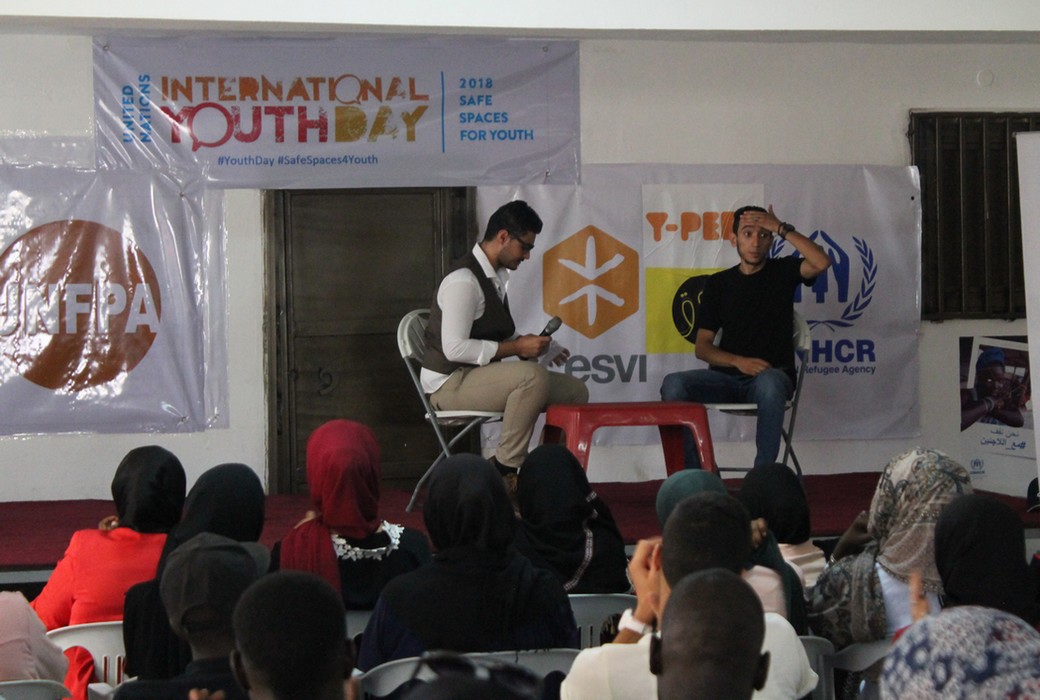Every day 7 teachers, 3 social workers, 2 animators and 6 other staff members (social assistants and cultural mediators) open the doors of the Social Center in Tripoli to over 120 refugees and asylum seekers. Here, these people can find a safe place where to meet each others, share experiences, support each other and empower themselves and their community.
The activities belong to three main areas: non-formal education, psychosocial support and awareness-raising events.
Nawal, a 47-year-old Sudanese refugee from Darfur and mother of 4 children, said the Social Center “is like a second home to me and my children. It gave us purpose and hope. My acquaintances have become friends and the staff has become a family”. Having no relatives or many friends in the community, the Social Center gave her a strong sense of belonging: “I let go of all the negative energies and I feel relief by coming here”.
Non-formal education
Thanks to the support of Unicef, 127 children and their parents have joined non-formal education classes in Arabic, Math, English and Information Technology: these are much-needed activities in such a precarious situation, where migrants community access to formal education is very limited. The response of the children is very positive. upon their own request, Cesvi is planning to provide French classes.
The Social Center is also a place for meeting and socializing where refugee children can play in a proper child-friendly space, meet their peers and make new friends. Khetam, a 39-year-old Palestinian single mother who has been supporting 6 children all by herself, is one of the Arabic teacher working in the Social Center. “I was not accepted to work in any of the Libyan schools. Working here has made me feel alive again. The Social Centre, in addition to being an income opportunity, is also a place for me and my children where we feel safe and understood”.
Psychosocial support
Women and men also take part to sessions of group therapy hosted by two psychologists. The therapy helps them handling pressure and stress, and to find ways to support their family in facing the daily life challenges.
Every group can attend 4 to 6 sessions. Most of participants are men, and many of them are underage. The most common topics discussed are the journey towards Libya and the adaptation strategies for living in the country. It’s a very positive opportunity for sharing experiences and learning stories of resilience.
According to Saif, a 55 year-old Palestinian who has been shot in a leg, “Therapy sessions were very helpful, because they supported us in going through and overcome really tough situations”.
Social and awareness-raising events
Events supported by UNHCR in the Social Center are a precious opportunity for promoting social cohesion within and between migrants communities. The celebration of the World Refugee Day involved members of the Syrian, the Palestinian, the Iraqi and the Sudanese communities, who could express their culture and traditions through food sharing, traditional clothing, plays, dances and stories of migration. 244 refugees participated and celebrated culture diversity as an opportunity of self-enrichment. In this occasion Cesvi’s staff distributed 220 hygiene kits to improve hygiene conditions of families.
On International Youth Day, 53 girls and boys shared thoughts while working on an artwork exhibition on the themes of culture diversity, civil rights and security. The participants could experience the feeling of belonging to a welcoming community while being away from their homes and countries. As happened during the World Refugee Day, the staff distributed hygiene kits among the participants.
